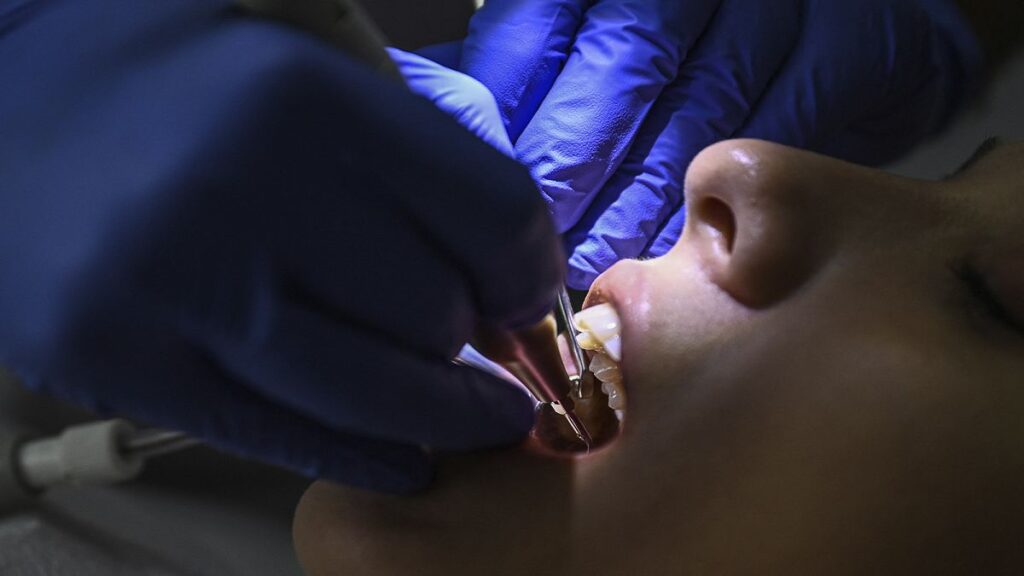Due to a lack of regulation, patients are leaving Turkey with teeth worse than when they arrived, and dentists in the country refuse to touch them.
advertisement
The moment Rida Azeem took off her mask, she knew her dental trip to Turkey had gone awry.
“There was a huge gap under the gum line and you could see all the metal bits[from the implant]. It was incredibly badly done,” said Azeem, an engineer from Manchester, England.
“Originally, I was planning on doing five implants,” she says. But when her treatment was about to begin, her dentist told her “all of her teeth would have to be extracted.”
“They looked professional,” says the 42-year-old, who now has to wear veneers.
According to the Turkish Dental Association (TDB), between 150,000 and 250,000 foreign patients flock to Turkey each year, drawn by the promise of a perfect smile at an unbeatable price, and travel to Hungary, Thailand and Turkey. It is also one of the most popular dental tourist destinations in the world. Dubai in the United Arab Emirates.
“The cheapest and best in the world”
TDB’s Tarik Ismen argues that Turkish dentists are simply responding to demand.
“Some people want to look like a Hollywood star and have a bright, fluorescent smile,” he says.
He explained that the surgical failure rate is “acceptably 3 to 5 percent and can happen anywhere,” adding that not one of the association’s 40,000 dentists has been fired.
Turkel Sandal, who pioneered dental tourism in Turkey 20 years ago, declares that “Turkish dentists are the best and cheapest in the world.”
“Not a single tooth has been extracted in 12 years,” he boasts at his clinic in Istanbul, where 99% of his clients are foreigners.
“But it is sad to say this, but 90% of clinics in Turkey are aimed at cheap dental treatment,” Sandalli said, accusing illegal operators of tarnishing the industry’s image. .
The director of a clinic in Istanbul, who requested anonymity, said some clinics in Turkey treat teeth that do not require treatment.
“They put veneers on teeth that only need bleaching or whitening, and sometimes even full crowns,” he says.
The British Dental Association has sounded the alarm over this phenomenon, warning that “low-cost treatment carries considerable risks” overseas, and warns that infections and “ill-fitting crowns and implants are falling out” are common. did.
Patrick Solera, from the French Dental Association, said he was horrified to see influencers going to Turkey “to get their teeth done”.
“You can’t put a crown on a tooth that’s a little bit yellow. Removing a healthy tooth to put a crown on it is tantamount to amputation. In France, you get imprisoned for that.”
Dental tourism: no way to get your money back
For victims, legal remedies upon return are scarce and costly.
“If the patient has already finished work and comes back from places like Turkey, the dentist refuses to touch the patient because it would be a liability,” Solera said.
advertisement
For Rida Azeem and Alana Boon, it is estimated that it cost them 30,000 euros just to repair the damage, three to four times more than they paid for treatment in Turkey.
Through persistence, the British engineer was able to recover €3,000 from an Istanbul clinic. This was not enough to pay for her dentures, which had to be made in Pakistan to restore “90%” of her smile.
A Turkish dentist offered to treat her when she returned, “but I was too scared,” Azeem said.
“If you need treatment, find your own practitioner, talk to them in person, and don’t go without an online consultation,” says Burg Holmgren, a lawyer at London Legal International.
She said she has helped more than a dozen patients with dental problems in Turkey get relief.
advertisement
“The process is very slow, taking about two years,” Holmgren said, adding that he wins in 96 percent of his cases.
Berna Aytak, president of the Istanbul Dental Chamber, said she still believes in medical tourism but is concerned about the number of students who want to enter the profession.
In 2010, there were 35 dental faculties in Turkey, but now there are 104 faculties.
“We are creating the future of unemployment,” Aytak said. “And even if they do find a job, unfortunately some people don’t really care about ethics.”


